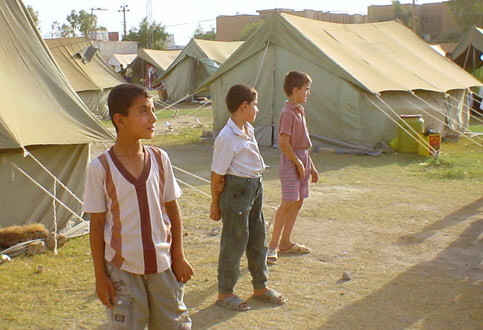IRIN 26 March 2006

Palestinian refugees in Iraq have been evicted from homes and are living in tents. (IRIN)
AMMAN — Palestinian refugees fleeing Iraq, who were refused entry into Jordan last week, are now receiving assistance from UN refugee agency, UNHCR, and the Iraqi Red Crescent Society (IRCS).
On Sunday, Ehab Taym, one of 88 Palestinian refugees who recently fled Baghdad, speaking from the Iraqi side of the border, said that the IRCS and UNHCR-Amman had sent blankets, tents, food and water.
After having been moved from the “No Man’s Land” border area to the Iraqi side of the frontier, Taym said they were now housed in 20 tents provided by the aid agencies. They now await their fate.
According to UNHCR officials, about a week’s worth of humanitarian assistance in the form of food, mattresses, blankets, stoves and lanterns was provided to the refugees on Thursday.
“We’re trying to ensure that the basic needs of the group, such as food and water, are met,” said Anne-Marie Deutschlander, a UNHCR-Jordan senior protection officer, in a statement. “However, the group is now in an area inside Iraq which makes it extremely difficult for us to have access or intervene.”
Last week, the refugees fled Baghdad, where members of the group claim they suffered persecution and intimidation. According to Taym, he and his colleagues were regularly exposed to violence, mostly by unknown perpetrators, in and around their Baghdad compound. “If we go back to Baghdad, we’ll suffer,” said Taym. “If they send us back, we’ll get killed.”
There are an estimated 34,000 Palestinians in Iraq, of whom 23,000 are registered as refugees with the UNHCR in Baghdad. According to UNHCR figures, Palestinian refugees came to Iraq in three main waves, in 1948, 1967 and 1991.
Under the Saddam Hussein regime, Palestinians enjoyed a number of privileges, viewed by some Iraqis as unfair. In recent years, this simmering resentment has resulted in Palestinians regularly facing threats, harassment and evictions, according to aid workers.
“This wasn’t a rash decision on the part of the refugees, who felt they were leaving a life-threatening situation,” said Cathy Breen of the Christian Peacemaker Team in Jordan, members of which initially accompanied the group from Baghdad to the border. “It was a dire situation they were facing.”
Breen added that there were daily accounts of the killing of Palestinians, including a gruesome report of the beheading of a Palestinian refugee just outside the Baghdad compound.
“When our colleagues spoke to some of the group, they said they had no wish to return anywhere in Iraq,” said Deutschlander. “Several of them have been traumatised in past weeks, with family members being kidnapped and even killed.”
Mohammad Abu-Baker, director-general of the refugee department at the Palestinian Embassy in Amman, said that the Palestinian Authority was doing what it could to find a solution to the refugees’ plight, although this could include sending them back to Baghdad. “Our position concerning the refugees in Iraq and elsewhere is that either we receive them inside Palestinian National Authority territories or they stay near the border and return to Baghdad,” Abu-Baker said.
Regarding last week’s border closure, Jordanian government spokesperson Nasser Judeh said the border had officially reopened on Thursday because “the issue regarding the 88 refugees had been resolved”, with Baghdad agreeing to take the refugees back to Iraq.
This item comes to you via IRIN, a UN humanitarian news and information service, but may not necessarily reflect the views of the United Nations or its agencies. All IRIN material may be reposted or reprinted free-of-charge; refer to the copyright page for conditions of use. IRIN is a project of the UN Office for the Coordination of Humanitarian Affairs.
Related Links